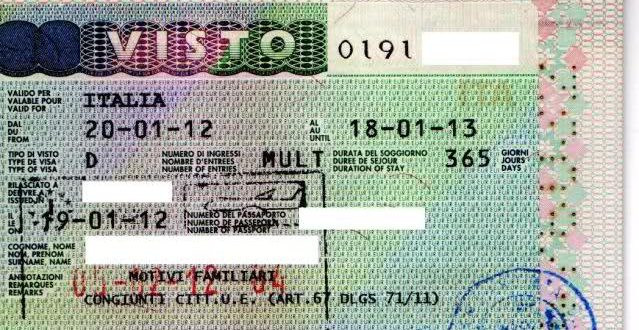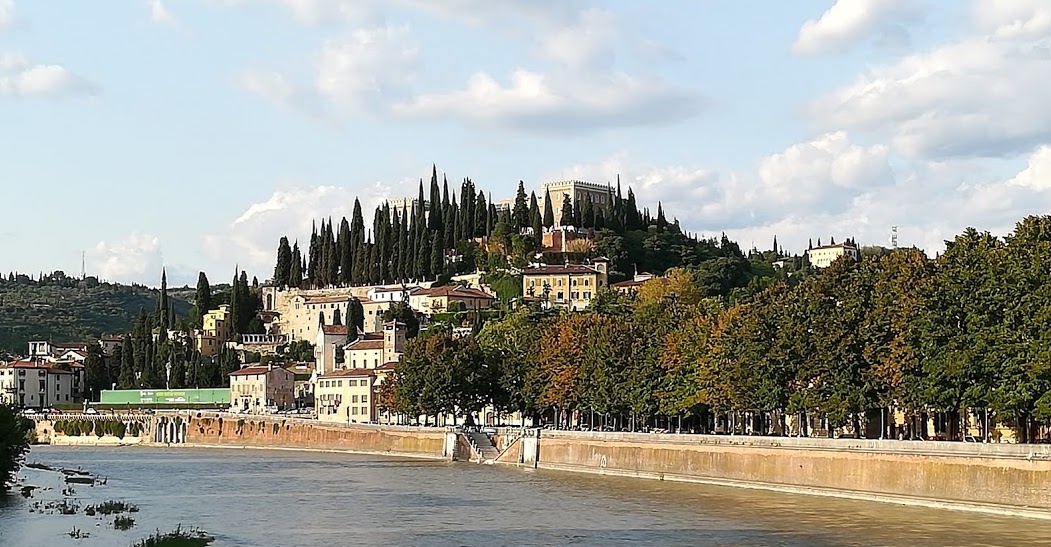(Editor’s note: This post on Italy’s Elective Residence visa was updated on 20 February 2019 with additional information. With less than two months till Brexit, this has become one of Dispatches’ most popular posts. Coincidence? We think not …. )
I like to think that my expat journey has been well thought out, each step planned purposely and built precisely upon the previous. Last year, as the first step toward eventually living or working in Italy for several years before officially retiring, I spent 6 months on a study visa formally studying Italian in Bologna and Montepulciano.

THE AUTHOR (CENTER) WITH FRIENDS FRANCESCO AND LUIGINA AT LAKE BOLSENA BETWEEN ROME AND SIENA
I had romantic visions of parlaying my language skills – level B1 at best – into some type of work in my favorite corner of the entire world, at the Ciacci Piccolomini d’Aragona vineyard near the abbey of Sant’Antimo in the Val d’Orcia of Tuscany. Or, perhaps something loftier, like a spin at the Global Reporting Initiative (GRI) or a GRI consulting firm in Italy.
After language school, I spent the 90 days allowed in addition to my visa period (see Schengen Zone visa restrictions) traveling in Italy, theoretically researching places to work and live, forging friendships with Italians, friendships I doubt would have been as strong had I not had some degree of fluency.

THE AUTHOR, LEFT, AT COOKING CLASS IN THE FOODIE HOTSPOT OF BOLOGNA
Every single day last year was an adventure, even the walks to and from school through the historic Quadrilatero in Bologna. Every single day was a sensual kaleidoscope of culinary, historic, architectural, artistic and scenic culture. Every single day seemed like a vacation, and after a few months, felt like semi-retirement.
Then, the unexpected happened: after being immersed in a sumptuous culture, on vacation every single day for 9 months, I could not imagine going back to work … not in Italy, not in Europe, and especially not in the U.S. So much for my intention and romantic notions.
Returning home to the U.S., I declared, “I am retired,” and started to work on the next step in my expat journey, permanent residency in Italy.
Elective residence visa
 Obtaining an Elective Residence visa, or any visa*, is not for the casual traveler, the timid, or the disorganized. Think of it as a badge of honor for complying with a lengthy and vague checklist of requirements (each checklist different, depending on the consulate), awarded only after having done extensive homework, having corresponded extensively with landlords or other administrators (or dear friends) in Italy, and having paid in advance for annual rent, annual health insurance, and a flight into the country.
Obtaining an Elective Residence visa, or any visa*, is not for the casual traveler, the timid, or the disorganized. Think of it as a badge of honor for complying with a lengthy and vague checklist of requirements (each checklist different, depending on the consulate), awarded only after having done extensive homework, having corresponded extensively with landlords or other administrators (or dear friends) in Italy, and having paid in advance for annual rent, annual health insurance, and a flight into the country.
And to keep visitors “off the dole” it is imperative to show a documented, guaranteed and regular source of private income. That’s some commitment to make before even submitting the visa application and $143 fee to the local consulate.
But, as they say in Italy, “Ne vale la pena!” (It’s worth it!)
A local friend who’d lived in Italy for 13 years originally suggested the Elective Residence visa. Nowhere on the consulate website does it explain what an “Elective Residence” visa really is. So, because I couldn’t comply with requirements for any other visa type – study, independent work, sport, religious activity, military dependent, etc. – I began applying for Elective Residence without completely comprehending I was declaring permanent residence in Italy. Okay, not exactly “permanent” – but permanent as long as I want to stay and can keep renewing my Permesso di Soggiorno.
A word of advice: There are plenty of blogs about applying for various types of visas, including Elective Residence and its requirements. READ THEM! It is difficult to reach a live person at any consulate, so rely on us “road warriors” for detailed advice.
Fortunately, after three attempts, I was able to reach the Consulate of Italy in Detroit (my jurisdiction for Kentucky), and, according to an email from someone in the Visa Office:
With regards to the Elective Residence visa, this type of visa is intended for those who are looking to permanently relocate to Italy and have sufficient funds (not deriving from work activities, but deriving from pensions or investments) to support themselves. The Elective Residence visa is not intended for extended tourism/vacation.
Immediately I had to shift mental gears and couch my requests less in a “visitor” mentality and more in a long-term resident framework.
The (strenuous) requirements
In addition to proof of citizenship and a passport, there are three major pieces of proof necessary for an Elective Residence visa. These are not to be underestimated.
1. “Proof of financial means: documented and detailed guaranteed of substantial and steady private income (pension or annuity) deriving from property, stable economic and commercial activities or from other sources. Please note that this visa does not allow any work activities in Italy. Therefore you cannot finance your residence in Italy through any type of work.”
Italian officials are really, really serious about this.
Since there are no standards stated on the consulate websites, and not feeling the need for an immigration attorney, I searched and found an excellent article from Italywise.com to figure out how to comply with this requirement.
At age 59, I’ve not officially declared or applied for any sort of retirement, nor have I started receiving any sort of annual pension or annuity, nor do I have a regular source of income from any other activity such as rental property. What I do have is savings … and a low cost of living.
After providing tax forms and proof of savings (and a tiny bit of begging), I must have convinced the nice advisor at the consulate that I was able to support myself financially. I consider myself lucky on this account, as it is probably the most important requirement for the visa and the one for which I had the least specific proof. Perhaps it was because this was my second visa application that she granted the visa without me meeting the exact requirement.
2. “Proof of Lodging: contract of purchase/leasing of house or apartment in Italy totally paid for in Original signed by both.”
Because this requirement is so vague as to the nature of the lease, I wrote the Consulate three times with a draft contract. After the third email, the Consulate explained requirements for the lease, and that it had to be for a minimum of one year.
Because I am renting from a friend, in her home in Verona, my friend “the locatrice” had to register the signed lease with the Agenzia dell’Entrate, and obtain all necessary stamps from the agency. Fortunately, my locatrice accomplished this within a week. (Fortunately, I already had an Italian Codice Fiscale, as well.)
3. “Proof of overseas health insurance covering 100% of all medical expenses.”
Do not approach this purchase lightly. There are myriad websites offering medical coverage, with a variety of deductibles, and some with other traveler benefits. Having already purchased travel insurance (flight delay, lost baggage, repatriation of remains, trip cancellation, medical coverage, etc.) from Berkshire Hathaway, I purchase an annual health insurance policy for $1,200 from Patriot International. Dita incrociate (“fingers crossed”), I never have to use it!
After submitting the application and all of the signed, stamped, and paid-for documents, it was “dita incrociate” for a week or so while waiting for my visa and passport to arrive – 3 days before my departure flight! Now I’m back in Europe, visa in hand, about to start my first year of Elective Residence in Italy.
4. Permesso di Soggiorno – the process continues
Within eight business days of arriving in Italy to start enjoying my newfound “resident” status, I had to apply for the Permesso di Soggiorno, or PDS, a permit to stay for the duration of the visa, required for any non-EU, non-refugee person planning to stay in Italy for more than 90 days.
It can take months to receive the PDS, which then basically supersedes the visa. It helps to either stay put or stay close or have the flexibility to return to the local Questura, because there are interim steps in the process that require showing up at a specific date and time for fingerprints and submission of two extra photos.
All communication is done in Italian via SMS (with the exception of six major cities), so make sure you have a phone number that will receive messages from a European number. Weeks (perhaps months) after being fingerprinted, you will receive another SMS indicating that the PDS is ready, plus a specific time it should be picked up at the local Questura.
I happened to be in Sicily when the SMS arrived for an appointment only two days away. I couldn’t return in time for the appointment, but showed up the following Monday at the office of immigration/Questura at 8 a.m. to stand in line with hundreds of immigrants, citizens renewing their passports and other PDS applicants, but was able to retrieve my PDS without an appointment.
The PDS may be used in lieu of a visa. This means that the PDS must be renewed in a timely manner, and the renewal may be granted for up to two years.
Retirement and permanent relocation are a slight detour from my original plans, but being free to explore, to be the flâneur I’ve always joked about becoming, is exciting, and well worth the process and patience of applying for a visa.
* In Europe, there are special rules about staying in an area that loosely includes EU countries, called “The Schengen Zone,” for more than 90 days. In other words, to travel or stay in Europe for more than 90 days, you have to have a visa. For Italy, there are at least 14 types of visas. And the process and checklists vary by consulate in the U.S. Again, obtaining a visa is not for the timid, the disorganized, or the passive.
 About the author:
About the author:
Nancy Church developed wanderlust at the age of 10, which fed her love of languages and led her to study French, then Italian. A world nomad, she lived in Bahrain and has since traveled to 26 countries.
An MBA, her career includes 25 years in product development and marketing in the financial services industry, for firms including Ernst & Young. Before retiring in 2017 to travel extensively, Nancy worked for the U.S. Green Building Council, promoting sustainable buildings and smart growth.
When not in her hometown of Louisville, Ky., she enjoys exploring and hiking in Europe, and visiting with friends she has made in her travels.














